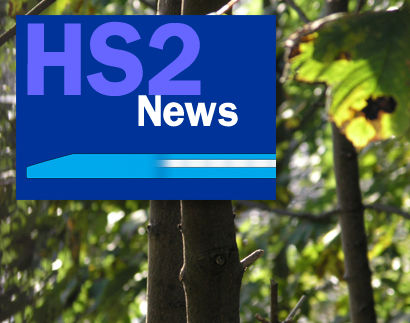A REPORT from the Commons Public Accounts Committee has levelled a new broadside at HS2, claiming that the business case remains flawed. In particular, MPs on the Committee are unconvinced that the regions, rather than London, will benefit.
But transport secretary Patrick McLoughlin said the justification for the line between London, Birmingham, Manchester and Leeds remained 'absolutely clear'. The Prime Minister had anticipated today's report, by saying that he was ready to fight back against the 'unholy alliance' of various interests and lobby groups opposing the scheme. There is growing speculation that Mr Cameron is set to appoint a Minister for HS2.
Network Rail has also defended the scheme today, saying that HS2 is 'absolutely vital', while Birmingham Chamber of Commerce has dubbed it 'hugely misleading'.
Today's report from the Public Accounts Committee said that the Department for Transport 'has not yet presented a convincing strategic case' for the project. It acknowledged that more than £14 billion of the budget is a contigency margin, but said: "The programme’s large contingency appears to be compensating for weak cost information. The Department is 95 per cent confident that it will stay within the £42.billion indicative budget it has agreed with HM Treasury for the full Y-network (excluding the £7.5 billion cost of trains).
"This figure includes £14.4 billion (a third of the total budget) for contingencies, although even this large contingency would not cover significant changes in scope, such as new stations or tunnels. The Department has allocated a higher level of contingency for Phase Two because its cost estimates are not as developed as those used in Phase One."
Committee chairman Margaret Hodge commented: "The pattern so far has been for costs to spiral - from more than £16 billion to £21 billion plus for phase one – and the estimated benefits to dwindle.
“The Department has been making huge spending decisions on the basis of fragile numbers, out-of-data data and assumptions which do not reflect real life, such as assuming business travellers do not work on trains using modern technology.
“In my Committee’s experience, not allowing enough time for preparation undermines projects from the start. A rushed approach contributed to the failure of the Intercity West Coast franchise award. The Department has increased its High Speed rail team, but getting the right mix of skills is challenging and the Department lacks the commercial skills necessary to protect taxpayers’ interest on a programme of this size.”
The report also voiced the Committee's concerns about the realism of the regional benefits which the DfT is claiming, saying: "The Department should publish detailed evidence which clearly shows why it considers High Speed 2 to be the best option for increasing rail capacity into London, improving connectivity between regional cities and rebalancing the economy."
However, the Prime Minister was evidently braced for another unsympathetic assessment from the Public Accounts Committee, which has previously expressed doubts about the scheme.
Mr Cameron, speaking at the G20 summit in St Petersburg, said: "I would urge the doubters to think big [about] what this can mean for the country. I accept the government needs to step up and make a really powerful argument."
Transport secretary Patrick McLoughlin, who is expected to unveil a new official assessment of HS2 this week, added that the classic rail network was in danger of being 'overwhelmed' by rising demand. He said: "The project will free up vital space on our railways for passengers and freight, generate hundreds of thousands of jobs and deliver better connections between our towns and cities."
Meanwhile other opponents to HS2 have reacted to the PAC's conclusions. Joe Rukin of StopHS2 said: "The problem is that the Government just do not want to listen. Now that every argument they have put up for building HS2 has been destroyed, they are ready to invent some new ones. It doesn’t matter if it is the Public Accounts Committee, the National Audit Office, the Institute of Economic Affairs, the Institute of Directors or even Treasury officials trying to explain that HS2 is a bad idea to the rump of politician. Trying to get the point across to a pig-headed Government is like talking to a brick wall.”
But the industry is moving to defend the plans. Network Rail group strategy director Paul Plummer said: “HS2 is absolutely vital for the future of Britain’s rail network.
“Unprecedented growth in the last ten years has seen the number of passenger journeys increase by 50 per cent to almost 1.5bn a year and demand continues to grow. We are already delivering the biggest capacity improvement programme since the Victorian era, but even this is not enough. Without HS2, the West Coast Main Line – our busiest and most economically important line – will be full in a little over a decade.
“The alternative schemes offer some incremental benefits but they would be a costly and disruptive short-term fix. There is already a critical shortage of space at the southern end of the West Coast Main Line and we need a step-change in capacity if we are to meet future demand. The only way to solve this is to build a new line.
“HS2 offers a rare chance to stop playing catch-up on rail capacity. If we get ahead of the game we can create huge opportunities for growth and connectivity while providing the capacity we need for the future.”
Jerry Blackett, chief executive of Birmingham Chamber of Commerce Group, claimed HS2 was the only choice. He said: "There are no alternative options which provide the step change in capacity that HS2 will deliver. It has the potential to transform the region economically. In the short-term, the stimulus created by its construction will be an enormous boost. In the longer-term, the region becomes a much more viable prospect for potential investment, and we could see a massive benefit from migration further north.”


